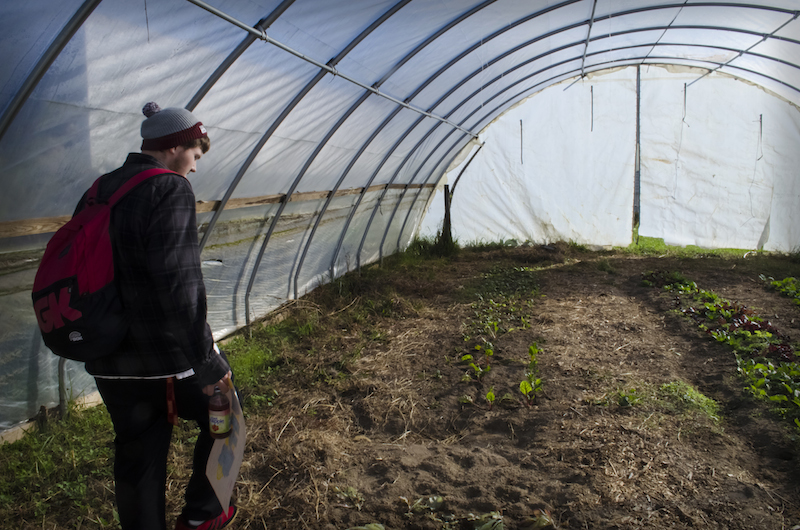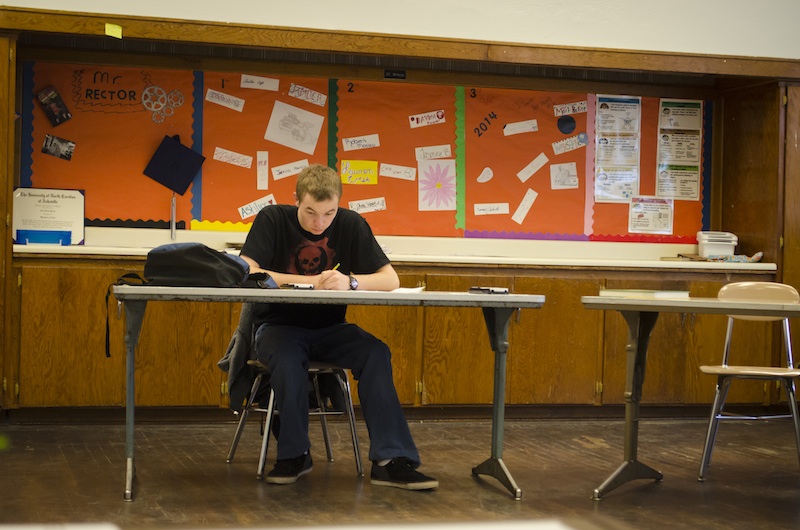It’s an early autumn morning, yet the roughly 20 teenagers gathered in their school library for a 9 a.m. student council meeting are wide awake. Outside, the winds ushering in the season’s first cold front are howling, rattling the windows and seeping through the 90-year-old walls. It’s not quite winter yet, but these students are already discussing a pivotal rite of spring: high school graduation, or more specifically, where to host it.
“I can tell you right now, my people ain’t going to come if it’s all the way out here,” says 17-year-old DeaMoney Caldwell.
Location is an issue to be addressed early and often here at Community High. Although it’s in Swannanoa, Buncombe County’s alternative high school includes students from every county school district, as well as the Asheville City Schools.
The kids who come here face significant challenges. Some are in foster care, some are homeless, some live with their families in poverty. Some have social anxieties, eating disorders, mental illness or learning disabilities. Some are young parents; others work to help support their family. Things that might seem simple, such as when and where to hold the spring graduation ceremony, often are not.
Transportation is a daily struggle. The students catch their first bus to their district (or “base”) school, often before 6:30 a.m. There, they’ll wait about half an hour for a second bus to take them to Community High: a total travel time of almost two hours. In the winter, when snow can lead to late starts and early closures, this can mean spending more time on the bus than in the classroom.
And for these students, the time spent on the bus or waiting at a base school (where they’re kept separate from the other kids) is often time spent feeling ostracized, even ridiculed. They say they hear names like “misfit,” “criminal,” “slut” and “disease.”
“I tell people I go to Community High, and they say: ‘Why do you go there? Are you a bad kid?’” 17-year-old Jasmine Babb reports.
Erica Battle, Community High’s instructional coach, says her students tell her it’s seen as “the bad kids’ school.”
“They hear it from students at their base school; they hear it from staff at their base schools, ” says Battle. “The public either buys into that or doesn’t know much about us. So this year more than ever, our students are voicing that they want to be known for the good things they do.”

Personal attention
And it seems there are good things happening at Community High. In the last academic year, the school met state-mandated progress goals for end-of-course test scores. And beginning this semester, the school has college-level Advanced Placement classes, something only a handful of alternative high schools in North Carolina offer.
“It lets them know we believe they are capable of going to college, because this is a college-level class,” notes AP statistics teacher Teresa Caron.
Enrollment at Community High fluctuates constantly: Each semester, some students graduate, and new ones periodically transfer in. Attendance is never perfect. Some students will drop out — sometimes for a while, sometimes forever. And yet, 30 of the roughly 140 students, or 21 percent, are currently enrolled in AP courses.
They won’t be required to sit for the AP exam that comes at the end of the course, and Caron says she doesn’t expect that every student will master all the material. But she believes that participating in these classes is raising the self-esteem of kids who’ve been told their whole lives that they will fail.
“I’ve been in schools where the teachers say, ‘Well, they just need to get over it: They’re in high school now.’ And they cut them no slack for what they’re dealing with at home,” said Caron. “Some of these kids that come here, they’ve been kicked out, they’re homeless, some of them have babies. You can’t just say, ‘I don’t care what’s going on outside of the classroom: Do what I require in here and don’t bring it in.’ It’s a part of them.”
The kids are quick to praise their school’s student-teacher ratio: With 15 teachers for about 140 kids, classes at Community High average 10 students or less.
“It’s literally like you sit down with a teacher and, one-on-one, you can talk with them,” said Babb. “At a normal school, it’s 20-something people in a classroom, and you never get to sit down with the teacher unless you make a date. It doesn’t work like that here.”
The low ratio also encourages better behavior, according to English teacher Michael Presson. “A lot of times students just need to be able to say what’s bothering them and then they’re good. If I had 27 or 30 people in my class, I couldn’t do that. But some students are just crying out for attention, and when you can give them that, they’re OK.”
Colton Sharpe, 17, said that added attention has helped some of his classmates stay in school.
“I know there are a lot of people who could have just as easily got expelled or suspended at their other school, but here they talk with you, work with you,” he said. “They let you sit in a room, give you a chance to think about and work on it, hopefully.”

Opening minds
By their own admission, these kids are cliquish like all high-schoolers, but staff and students say Community High is a largely peaceful school, with little to no bullying. Students describe Community High as “drama-free” and “a community of separate, peaceful nations” where fights are uncommon. And when they do happen, they’re resolved through staff-mediated conversations.
“Everyone is here for a reason, so everyone can relate to everybody,” said Caldwell.
What the school doesn’t have is art and music classes, sports teams or any after-school activities, due to students’ extended travel time and part-time jobs.
There is no PTO here either. Many parents and guardians lack reliable transportation or simply don’t have time to make the trek to Swannanoa. That means they often can’t attend parent-teacher nights (though local churches have sometimes provided busing for those events) or even school-based graduation ceremonies. There’s also no funding for traditional high-school activities like dances, or even a prom, unless the students come up with the money themselves. Churches, rotary clubs and nearby Warren Wilson College do help out, but the burden of organizing still falls largely on the students.
At this day’s student council meeting, suggestions for fundraising activities — a car wash, a doughnut sale — are carefully weighed. Caldwell is leery of a costume contest, but is advocating for something food-related. Later, they discuss behaviors that should merit dismissal from the council. Chief among these are bullying and instigating fights. They talk about ways to improve their school. Sharpe says he wants to plant flowers in the spring, to brighten up the aged structure. Others are petitioning for bathroom improvements or ways to keep the cafeteria food (prepared at nearby Owen High and shipped over in hot boxes) from getting soggy. There’s even talk of adding school clubs soon.
At the same time, these kids must continue to deal with the negative image of their school and the stereotypes that many admit they themselves had when they first arrived at Community High.
“I wish we could just get the word out that we aren’t a bad school,” says Babb. “We don’t have bad kids: We actually have really good kids.”
When asked how they’d like their school to be seen, the council members respond excitedly: “open … unique … colorful … different … a melting pot … nonjudgmental … drama-free.”
“This school requires you to be open-minded,” says Caldwell. “You can’t come to this school with a closed mind.”
Click through the slideshow to view student artwork and more Xpress photos from Community High.
Student Poetry Submissions
EDITOR’S NOTE/INTRO:The excerpts below are from poems by Community High students written for Michael Presson’s English class. Students were asked to describe their lives using the model of “I Am Joaquin” by Rodolfo Gonzales, which they read while studying Latin American poetry.
“My mom raised three kids by herself, struggling to keep food on the table
My father is in prison, a sorry excuse of a dad
I am a 17 year old CHS student.
Coming up, I’ve seen a lot of things
Gangs. Drugs. Fights.
I grew up as fast as I could
I wanted to get out. I had to get out.
Becoming an adult I know I have to face life’s problems like an adult. By myself.
I will never give up on myself, even if everyone else does
I am a 17 year old CHS student.
My goal in life is to be successful
By any means necessary
I want people to remember me as the kid who made it
I will make it through anything.”
-J.M.
“We humans create problems for ourselves
War and ‘poverty’
We are the poverty
We have a taboo on our heads
An illusion of living life
I’m no better or no worse than any other
Careless of thought of those
Names and labels.”
-G.T.
“I am
thought of as a criminal
seen as a screw up
but known to be prepared
battle attire fitted
ready for war with anything
to threaten what little I have left
Hustling runs in my blood
from generation to next
from prohibition to powder
all the same to me
a boy with a mongrel blood line”
-E.C.
“Most of my life I have never known much about my mother
Due to the fact that she walked right out
Of mine and my brothers’ lives when I just six months old.
I have not seen or heard from her
In about four years
Even before that
She was never really a steady part of my life.
As for my father, he has struggled
Day in and day out
Just to make ends meet.
Many people I grew up with always complained
About so much they didn’t have
When I was lucky to have
Two pairs of shoes and one coat.”
-M.H.
“Living the life of a loner
Growing up to be a ticking time bomb
I am a CHS teenager
I still stand on my own two feet
I pass my classes
I’ll graduate early
I laugh at the sly remarks
I gaze over the immediate stares
I live as a student who has come to the end
To the name calling
To the cussing
To the laughing
To the hatred.
I ignore; knowing I am better to act”
-M.G.






Before you comment
The comments section is here to provide a platform for civil dialogue on the issues we face together as a local community. Xpress is committed to offering this platform for all voices, but when the tone of the discussion gets nasty or strays off topic, we believe many people choose not to participate. Xpress editors are determined to moderate comments to ensure a constructive interchange is maintained. All comments judged not to be in keeping with the spirit of civil discourse will be removed and repeat violators will be banned. See here for our terms of service. Thank you for being part of this effort to promote respectful discussion.